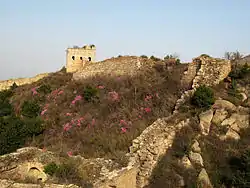Baishi Mountain
Baishi Mountain, also known by its Chinese name Baishishan,[lower-alpha 1] is a mountain in Laiyuan County, Baoding Prefecture, Hebei Province, China. Its highest peak has an elevation of 2,096 meters (6,877 ft) and its main ridge stretches for over 7,000 meters (22,966 ft).[5] Parts of the Great Wall snake around its foothills. Baishi Mountain forms the northern end of the Taihang Chain[6] and is located about 200 kilometers (120 mi) southwest of Beijing.[4]
| Baishi Mountain | |||||||||
|---|---|---|---|---|---|---|---|---|---|
 | |||||||||
| Chinese | 白石山 | ||||||||
| Literal meaning | White Stone Mountain | ||||||||
| |||||||||
| Baishi Scenic Area | |||||||||
| Traditional Chinese | 白石山景區 | ||||||||
| Simplified Chinese | 白石山景区 | ||||||||
| |||||||||
| Baishi National Geological Park | |||||||||
| Traditional Chinese | 白石山國家地質公園 | ||||||||
| Simplified Chinese | 白石山国家地质公园 | ||||||||
| |||||||||
.jpg.webp)
Background
Its name refers to the white marble making up parts of its bedrock.[4] The roughly 20 km2 (7.7 sq mi) of dolomite making up the top of the mountain[6] was formed about 1 billion[7] to 700 million years ago and was pushed into place by about 54 km2 (21 sq mi) of newly forming granite[6] created by a magma intrusion at the mountain's base about 140 mya.[7]
China's National Tourism Administration established the Baishi Scenic Area[2] in 2004.[7] The same area was declared the Baishi National Geological Park[4] when it was named a world geological park by UNESCO in September 2006.[7] The CNTA declared it a AAAAA-level tourist attraction in early 2017.[2] It is particularly well known for its appearance during overcast days, when the tops of nearby peaks can be seen jutting out from within low-lying clouds and mist.[4] Since September 2014, it has also had China's longest, widest, and highest glass skywalk,[4] stretching 95 meters (312 ft) over a ravine at an elevation of 1,900 meters (6,200 ft). A second skywalk opened in August 2015, with an elevation of 1,600 meters (5,200 ft).[4] There is also a regional tourism campaign aimed at promoting the mountain as a spot for lovers.[4]
The spider species Clubiona baishishan takes its name from its discovery near the mountain.
See also
Notes
References
- "New Breath-taking Glass Skywalk Opened on Tianmen Mountain", Chinese Culture, Xiamen: Chinlingo.
- "20 Additional Tourist Attractions Receive 5A-level Classification", China Daily, Beijing: China Daily Information Co, 20 February 2017, archived from the original on 28 April 2022, retrieved 9 November 2017.
- "Whitestone Mountain Scenice Area", China: Beyond Your Imagination, China National Tourism Administration, archived from the original on 9 November 2017, retrieved 9 Nov 2017.
- Bi Nan (8 September 2017), "Early Autumn Scenery at Baishi Mountain", China Daily, Beijing: China Daily Information Co, archived from the original on 28 April 2022, retrieved 9 November 2017.
- Tian Shaohui, ed. (17 September 2015), "Fairyland on Earth: Baishi Mountain in Hebei", Xinhua Net, Beijing: Xinhua.
- Wu Meiling (18 Dec 2013), "Baoding: From the Capital's South Gate to Back Garden", China Today, Beijing: China Internet Information Center.
- "白石山世界地质公园", 旅游观光, Baoding: People's Government of Laiyuan County, 28 Nov 2016. (in Chinese)
External links
- Laiyuan County's official map of the Baishi Scenic Area
- Photos of Baishi Mountain from China Daily: 1, 2
- Photos of Baishan Mountain at Xinhua Net
- The glass bridge at Xinhua Net